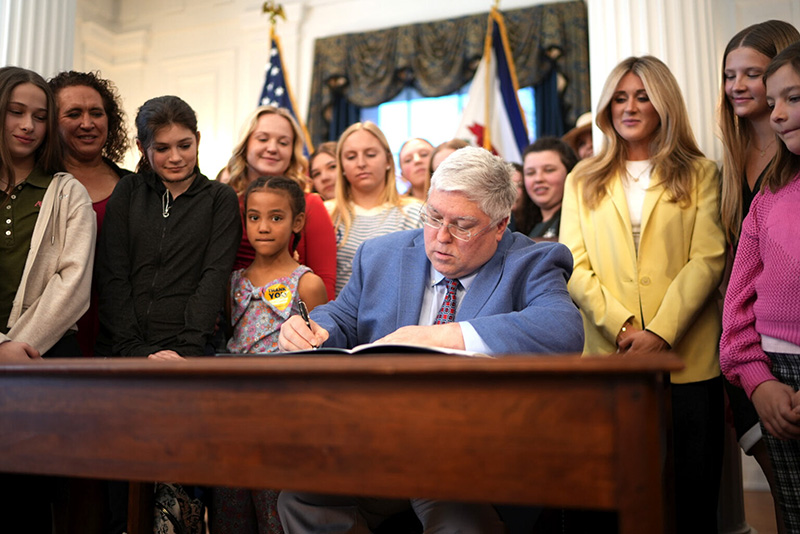Montana lawmakers approve bill to deny trans youth medical care
Critics worry denying care will increase youths' feelings of depression, anxiety, and suicidal ideation
By John Riley on January 22, 2021 @JRileyMW

The Montana House Judiciary Committee voted largely along party lines to approve HB 113, a bill that would prohibit transgender youth from accessing any medical treatments intended to aid in a gender transition and effectively gag doctors from recommending treatments that may be in their patients’ best interests.
The bill, sponsored by State Rep. John Fuller (R-Kalispell), would penalize doctors or nurse-practitioners who prescribe hormones or puberty blockers to transgender youth who have been diagnosed with gender dysphoria. Any provider who does so could be fined anywhere from $500 to $50,000 per infraction.
Fuller’s legislation also prevents surgical interventions, even though most doctors specializing in transgender health care already discourage transgender youth from undergoing surgery before 18 except in very rare cases.
What the bill would do, in practice, is not just delay care for transgender youth, but censor medical providers through intimidation. Out of fear of being fined or facing other disciplinary measures, medical providers could refuse to correctly diagnose a child with gender dysphoria, or even acknowledge or affirm a transgender youth’s gender identity.
LGBTQ advocates worry that bills like Fuller’s, which have been introduced in a slew of Republican-led legislatures this year, will simple increase feelings of isolation and suicidal ideation among youth.
According to The Trevor Project’s 2020 National Survey on LGBTQ Youth Mental Health, more than half of transgender or nonbinary youth have seriously considered suicide, more than 3 in 4 experience extreme anxiety, and more than 2 in 3 experience sever depression.
Research dating back to 2015 has shown that gender-affirming medical interventions, such as hormones or surgery, lowers the incidence of suicidal ideation among transgender teens.
Other factors reducing risk of suicide include greater parental and social support, fewer incidents of discrimination, being recognized according to their gender identity, and having personal identification documents that match their identity.
“HB 113 is based on a basic misunderstanding of transgender youth and the decades of research and medical experience showing that this best-practice medical care is in their best interest,” Sam Brinton, the vice president of advocacy and government affairs for The Trevor Project, said in a statement. “This type of best-practice medical care for transgender youth simply delays puberty until young people are old enough to make their own decisions about their gender identity.”
Brinton added: “This bill aims to take choices away from patients and parents by preventing them from accessing gender-affirming health care, which we know from research can lead to positive effects on body image, overall psychological well-being, and reduced suicidality.”
See also: More than 150 businesses oppose Montana’s anti-transgender bills
A recent national survey conducted by The Trevor Project last year found that over 90% of LGBTQ youth said political trends — specifically anti-LGBTQ actions or legislation — negatively influenced their wellbeing.
According to a Morning Consult poll, three-quarters of transgender youth reported heightened feelings of loneliness and isolation, which typically contribute to depression and suicidal ideation, since the start of the COVID-19 pandemic last March.
Fuller’s bill now heads to the full House for a vote, where it is likely to pass in the Republican-dominated chamber. In past years, when Montana had a Democratic governor, LGBTQ advocates could rely on a veto to block the bill. But newly-elected Gov. Greg Gianforte, a Republican, amassed an anti-LGBTQ record in Congress prior to his election, and is not considered an ally to the LGBTQ community.
The Judiciary Committee approved the medical intervention bill just a day after approving a measure — also sponsored by Fuller — that prohibits transgender people from competing in sporting events other than those designated for the gender that matches their assigned sex at birth.
Caitlin Borgmann, the executive director of the ACLU of Montana, said both of Fuller’s bills would cause “irrevocable harm” to transgender youth in the state if passed.
“We’re disappointed to see that the House Judiciary Committee is more interested in passing hateful laws than supporting trans youth in Montana,” Borgmann said in a statement. “As these bills move to the floor of the House, we hope lawmakers listen to Montana business leaders, medical professionals and associations, religious leaders, parents, and trans youth and oppose these harmful bills.
“If these discriminatory bills pass — we will sue, and we will win. Trying to defend laws in court that stigmatize and target trans youth doesn’t seem like a good use of taxpayer dollars to us.”
Related:
Mississippi wants to ban transgender people under age 21 from receiving gender-affirming care
South Dakota Senate kills bill to ban medical treatments for transgender youth
Read more:
FBI arrests “Straight Pride” organizer for attending Capitol riots
Reporter who criticized Detroit Lions coach’s anti-gay past apologizes for homophobic tweets
Biden’s Secretary of State nominee vows to allow embassies to fly Pride flags again
West Virginia Erases Transgender People from State Law
West Virginia Gov. Patrick Morrisey has signed a bill into law prohibiting legal recognition of transgender individuals' gender identities.
By John Riley on March 18, 2025 @JRileyMW
West Virginia Republican Gov. Patrick Morrisey signed a bill that effectively erases the existence of transgender people from state law.
Surrounded by anti-trans advocates, Morrisey signed the "Riley Gaines Act" -- named after the former collegiate swimmer-turned-anti-LGBTQ activist -- into law.
The law defines the terms "man" and "woman" based on a person's biological anatomy at the time of birth in the state code.
For all legal purposes, the state will not recognize the gender of any person who identifies outside of the gender binary or identifies as a gender that does not align with their assigned sex at birth.
Republicans join Democrats to Defeat Anti-Drag, Anti-Trans Bills
Montana lawmakers have rejected a pair of bills seeking to ban drag in the state and remove trans children from their parents' custody.
By John Riley on March 10, 2025 @JRileyMW
Lawmakers in the Montana House of Representatives defeated two anti-LGBTQ bills last week after the chamber's transgender and nonbinary representatives gave impassioned speeches protesting the measures.
State Rep. Zooey Zephyr (D-Missoula), the legislature's first out transgender representative, spoke out against House Bill 675, sponsored by Rep. Caleb Hinkle (R-Belgrade), which sought to ban drag performances and Pride parades in Montana.
Hinkle previously sponsored a ban on public performances of a "sexual nature" that was specifically intended to target drag shows and Drag Queen Story Hour-type events (even if they do not contain sexually explicit content).
Texas Bill Would Make Identifying as Transgender a Crime
A proposed law in Texas could jail trans individuals who attempt to be recognized by their gender identity under the provision of "fraud."
By John Riley on March 10, 2025 @JRileyMW
A newly introduced Republican bill in Texas seeks to criminalize anyone who identifies as transgender.
Introduced by State Rep. Tom Oliverson (R-Cypress), the bill would amend the Texas Penal Code to create a new form of fraud known as "gender identity fraud."
Under the bill, if a person makes a "false or misleading verbal or written statement" to a government entity or a private employer asserting that their gender is the opposite of the biological sex assigned to the person at birth, that person could be charged with a felony, could serve up to two years in prison, and be fined $10,000.
Support Metro Weekly’s Journalism
These are challenging times for news organizations. And yet it’s crucial we stay active and provide vital resources and information to both our local readers and the world. So won’t you please take a moment and consider supporting Metro Weekly with a membership? For as little as $5 a month, you can help ensure Metro Weekly magazine and MetroWeekly.com remain free, viable resources as we provide the best, most diverse, culturally-resonant LGBTQ coverage in both the D.C. region and around the world. Memberships come with exclusive perks and discounts, your own personal digital delivery of each week’s magazine (and an archive), access to our Member's Lounge when it launches this fall, and exclusive members-only items like Metro Weekly Membership Mugs and Tote Bags! Check out all our membership levels here and please join us today!
The Magazine
-
Most Popular
 'Porn Star University' Started by Gay-for-Pay Creator Andy Lee
'Porn Star University' Started by Gay-for-Pay Creator Andy Lee  Trump Targets Law Firm for Defending Transgender Rights
Trump Targets Law Firm for Defending Transgender Rights  Bea Arthur's Air Force Bio Purged by Department of Defense
Bea Arthur's Air Force Bio Purged by Department of Defense  Montana Governor Signs Anti-Trans Bills into Law
Montana Governor Signs Anti-Trans Bills into Law  Anheuser-Busch Abruptly Ends Sponsorship of St. Louis PrideFest
Anheuser-Busch Abruptly Ends Sponsorship of St. Louis PrideFest  Priyanka Shetty On Her Incisive New Solo Play '#Charlottesville'
Priyanka Shetty On Her Incisive New Solo Play '#Charlottesville'  Gay Porn Star Tim Kruger Dead at 44
Gay Porn Star Tim Kruger Dead at 44  Above & Beyond: Spring Arts Preview 2025
Above & Beyond: Spring Arts Preview 2025  Trump Administration Kills LGBTQ Health Studies
Trump Administration Kills LGBTQ Health Studies  Cincinnati Pride Cuts Ties With Several Corporate Sponsors
Cincinnati Pride Cuts Ties With Several Corporate Sponsors
 Classical & Choral Music: Spring Arts Preview 2025
Classical & Choral Music: Spring Arts Preview 2025  Broadway: Spring Arts Preview 2025
Broadway: Spring Arts Preview 2025  Gallery: The Emotionally Sensual Artwork of Soltian
Gallery: The Emotionally Sensual Artwork of Soltian  Montana Governor Signs Anti-Trans Bills into Law
Montana Governor Signs Anti-Trans Bills into Law  Above & Beyond: Spring Arts Preview 2025
Above & Beyond: Spring Arts Preview 2025  Trump Targets Law Firm for Defending Transgender Rights
Trump Targets Law Firm for Defending Transgender Rights  Priyanka Shetty On Her Incisive New Solo Play '#Charlottesville'
Priyanka Shetty On Her Incisive New Solo Play '#Charlottesville'  'Sister Act' at Ford's is a Heavenly Good Time
'Sister Act' at Ford's is a Heavenly Good Time  Popular Music: Spring Arts Preview 2025
Popular Music: Spring Arts Preview 2025  Anheuser-Busch Abruptly Ends Sponsorship of St. Louis PrideFest
Anheuser-Busch Abruptly Ends Sponsorship of St. Louis PrideFest
Scene
Metro Weekly
Washington's LGBTQ Magazine
P.O. Box 11559
Washington, DC 20008 (202) 638-6830
About Us pageFollow Us:
· Facebook
· Twitter
· Flipboard
· YouTube
· Instagram
· RSS News | RSS SceneArchives
Copyright ©2024 Jansi LLC.










You must be logged in to post a comment.